Maximizing Benefits, Minimizing Challenges: Olympics Impact Analysis
VerifiedAdded on 2023/01/06
|13
|4292
|77
Report
AI Summary
This report analyzes the multifaceted impacts of hosting the Olympic Games, focusing on economic, social, and environmental perspectives. The analysis delves into the economic benefits such as job creation, investment, and tourism, while also addressing negative impacts like tax burdens and potential for infrastructure underutilization. The environmental impact is examined, highlighting pollution concerns and the importance of sustainable practices. Social impacts, including social cohesion and morale, are also discussed. The report emphasizes the need for long-term planning, sustainable construction, technological innovation, and cost-effective methods to minimize the negative consequences of hosting the Olympics. The report also highlights the importance of considering the long-term effects of hosting the Olympics, emphasizing the need for careful planning to mitigate potential losses, prioritize permanent infrastructure over temporary structures, and leverage technological advancements to counter disruptions.

Analysis to recommend ways
of maximising the benefits
and minimising the challenges
of hosting the Olympics
of maximising the benefits
and minimising the challenges
of hosting the Olympics
Paraphrase This Document
Need a fresh take? Get an instant paraphrase of this document with our AI Paraphraser
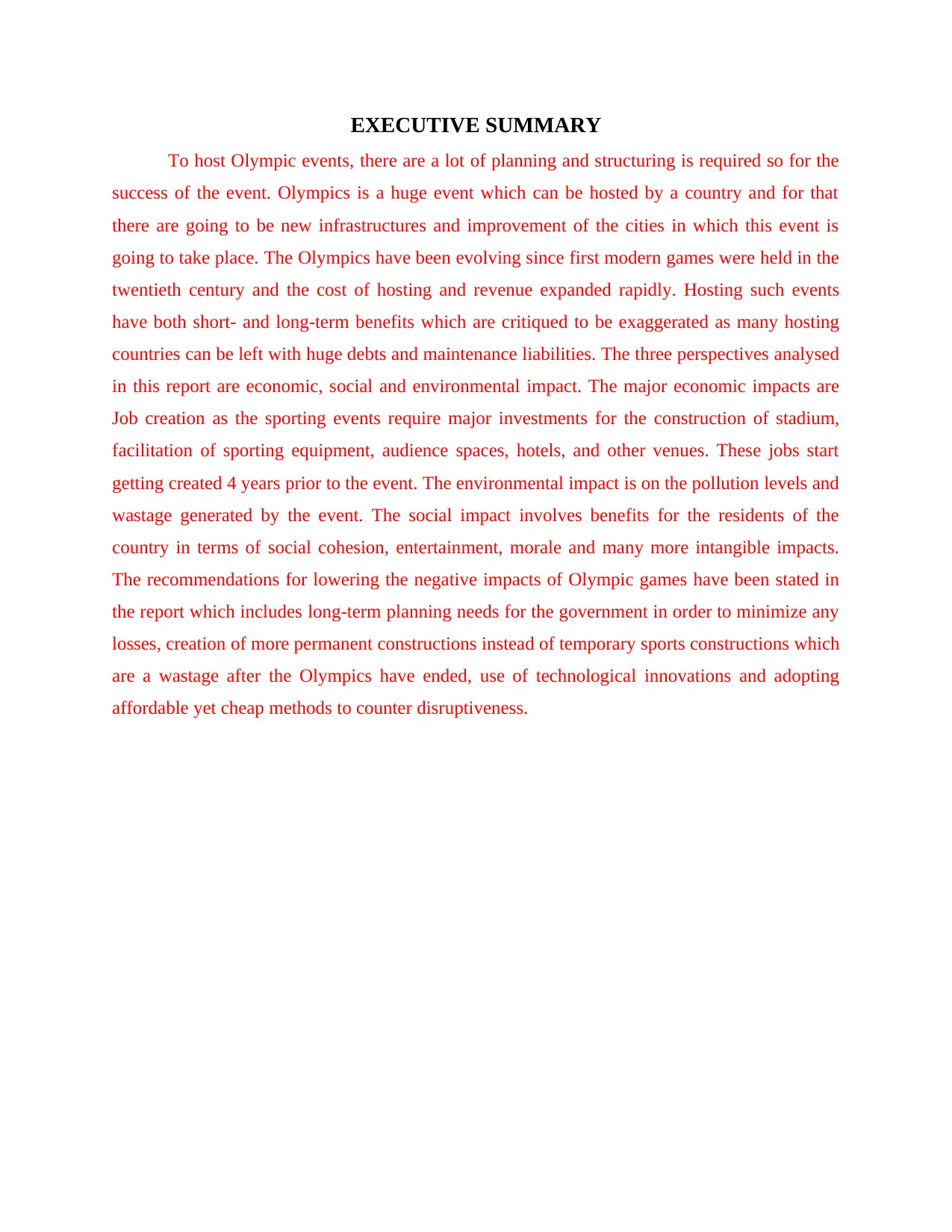
EXECUTIVE SUMMARY
To host Olympic events, there are a lot of planning and structuring is required so for the
success of the event. Olympics is a huge event which can be hosted by a country and for that
there are going to be new infrastructures and improvement of the cities in which this event is
going to take place. The Olympics have been evolving since first modern games were held in the
twentieth century and the cost of hosting and revenue expanded rapidly. Hosting such events
have both short- and long-term benefits which are critiqued to be exaggerated as many hosting
countries can be left with huge debts and maintenance liabilities. The three perspectives analysed
in this report are economic, social and environmental impact. The major economic impacts are
Job creation as the sporting events require major investments for the construction of stadium,
facilitation of sporting equipment, audience spaces, hotels, and other venues. These jobs start
getting created 4 years prior to the event. The environmental impact is on the pollution levels and
wastage generated by the event. The social impact involves benefits for the residents of the
country in terms of social cohesion, entertainment, morale and many more intangible impacts.
The recommendations for lowering the negative impacts of Olympic games have been stated in
the report which includes long-term planning needs for the government in order to minimize any
losses, creation of more permanent constructions instead of temporary sports constructions which
are a wastage after the Olympics have ended, use of technological innovations and adopting
affordable yet cheap methods to counter disruptiveness.
To host Olympic events, there are a lot of planning and structuring is required so for the
success of the event. Olympics is a huge event which can be hosted by a country and for that
there are going to be new infrastructures and improvement of the cities in which this event is
going to take place. The Olympics have been evolving since first modern games were held in the
twentieth century and the cost of hosting and revenue expanded rapidly. Hosting such events
have both short- and long-term benefits which are critiqued to be exaggerated as many hosting
countries can be left with huge debts and maintenance liabilities. The three perspectives analysed
in this report are economic, social and environmental impact. The major economic impacts are
Job creation as the sporting events require major investments for the construction of stadium,
facilitation of sporting equipment, audience spaces, hotels, and other venues. These jobs start
getting created 4 years prior to the event. The environmental impact is on the pollution levels and
wastage generated by the event. The social impact involves benefits for the residents of the
country in terms of social cohesion, entertainment, morale and many more intangible impacts.
The recommendations for lowering the negative impacts of Olympic games have been stated in
the report which includes long-term planning needs for the government in order to minimize any
losses, creation of more permanent constructions instead of temporary sports constructions which
are a wastage after the Olympics have ended, use of technological innovations and adopting
affordable yet cheap methods to counter disruptiveness.
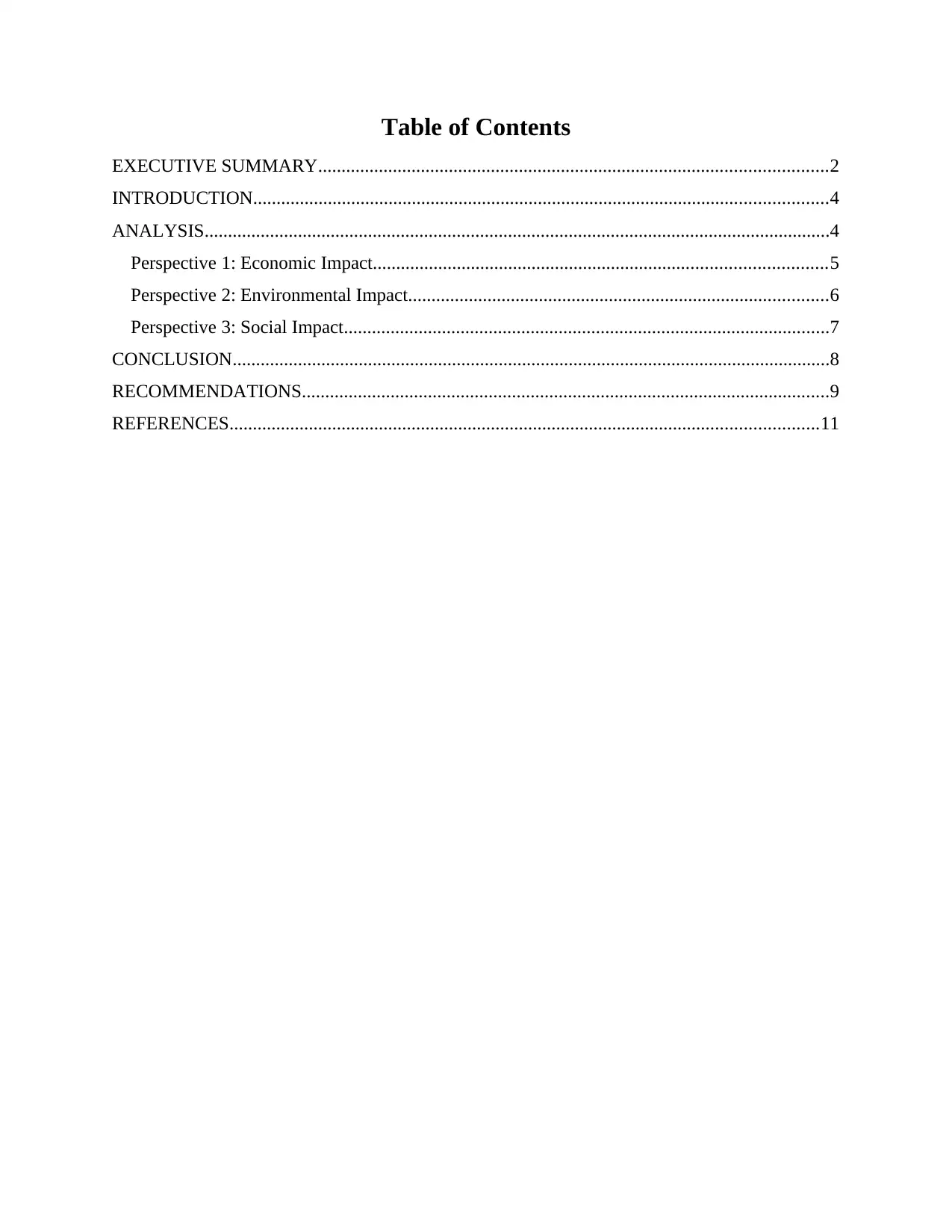
Table of Contents
EXECUTIVE SUMMARY.............................................................................................................2
INTRODUCTION...........................................................................................................................4
ANALYSIS......................................................................................................................................4
Perspective 1: Economic Impact.................................................................................................5
Perspective 2: Environmental Impact..........................................................................................6
Perspective 3: Social Impact........................................................................................................7
CONCLUSION................................................................................................................................8
RECOMMENDATIONS.................................................................................................................9
REFERENCES..............................................................................................................................11
EXECUTIVE SUMMARY.............................................................................................................2
INTRODUCTION...........................................................................................................................4
ANALYSIS......................................................................................................................................4
Perspective 1: Economic Impact.................................................................................................5
Perspective 2: Environmental Impact..........................................................................................6
Perspective 3: Social Impact........................................................................................................7
CONCLUSION................................................................................................................................8
RECOMMENDATIONS.................................................................................................................9
REFERENCES..............................................................................................................................11
⊘ This is a preview!⊘
Do you want full access?
Subscribe today to unlock all pages.

Trusted by 1+ million students worldwide

Paraphrase This Document
Need a fresh take? Get an instant paraphrase of this document with our AI Paraphraser
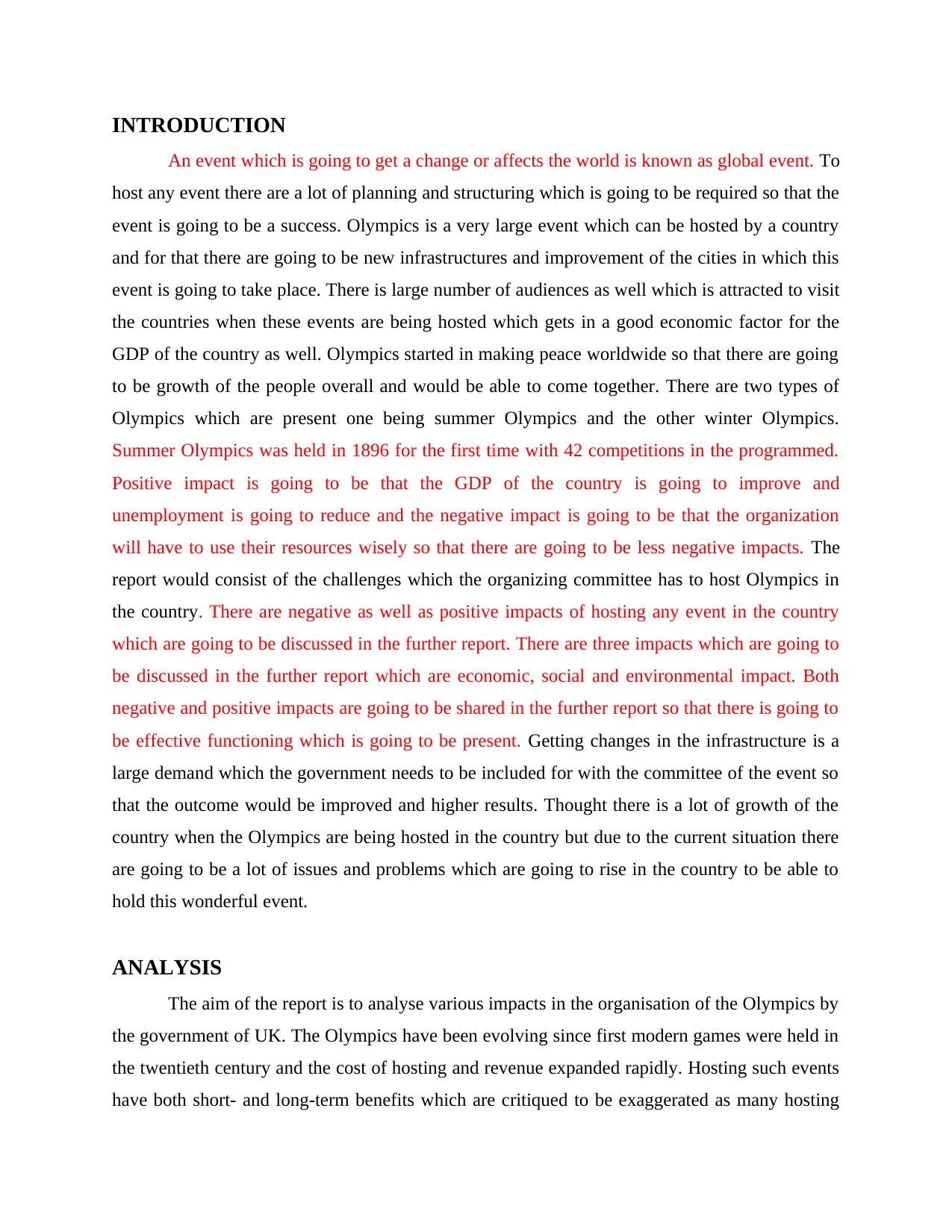
INTRODUCTION
An event which is going to get a change or affects the world is known as global event. To
host any event there are a lot of planning and structuring which is going to be required so that the
event is going to be a success. Olympics is a very large event which can be hosted by a country
and for that there are going to be new infrastructures and improvement of the cities in which this
event is going to take place. There is large number of audiences as well which is attracted to visit
the countries when these events are being hosted which gets in a good economic factor for the
GDP of the country as well. Olympics started in making peace worldwide so that there are going
to be growth of the people overall and would be able to come together. There are two types of
Olympics which are present one being summer Olympics and the other winter Olympics.
Summer Olympics was held in 1896 for the first time with 42 competitions in the programmed.
Positive impact is going to be that the GDP of the country is going to improve and
unemployment is going to reduce and the negative impact is going to be that the organization
will have to use their resources wisely so that there are going to be less negative impacts. The
report would consist of the challenges which the organizing committee has to host Olympics in
the country. There are negative as well as positive impacts of hosting any event in the country
which are going to be discussed in the further report. There are three impacts which are going to
be discussed in the further report which are economic, social and environmental impact. Both
negative and positive impacts are going to be shared in the further report so that there is going to
be effective functioning which is going to be present. Getting changes in the infrastructure is a
large demand which the government needs to be included for with the committee of the event so
that the outcome would be improved and higher results. Thought there is a lot of growth of the
country when the Olympics are being hosted in the country but due to the current situation there
are going to be a lot of issues and problems which are going to rise in the country to be able to
hold this wonderful event.
ANALYSIS
The aim of the report is to analyse various impacts in the organisation of the Olympics by
the government of UK. The Olympics have been evolving since first modern games were held in
the twentieth century and the cost of hosting and revenue expanded rapidly. Hosting such events
have both short- and long-term benefits which are critiqued to be exaggerated as many hosting
An event which is going to get a change or affects the world is known as global event. To
host any event there are a lot of planning and structuring which is going to be required so that the
event is going to be a success. Olympics is a very large event which can be hosted by a country
and for that there are going to be new infrastructures and improvement of the cities in which this
event is going to take place. There is large number of audiences as well which is attracted to visit
the countries when these events are being hosted which gets in a good economic factor for the
GDP of the country as well. Olympics started in making peace worldwide so that there are going
to be growth of the people overall and would be able to come together. There are two types of
Olympics which are present one being summer Olympics and the other winter Olympics.
Summer Olympics was held in 1896 for the first time with 42 competitions in the programmed.
Positive impact is going to be that the GDP of the country is going to improve and
unemployment is going to reduce and the negative impact is going to be that the organization
will have to use their resources wisely so that there are going to be less negative impacts. The
report would consist of the challenges which the organizing committee has to host Olympics in
the country. There are negative as well as positive impacts of hosting any event in the country
which are going to be discussed in the further report. There are three impacts which are going to
be discussed in the further report which are economic, social and environmental impact. Both
negative and positive impacts are going to be shared in the further report so that there is going to
be effective functioning which is going to be present. Getting changes in the infrastructure is a
large demand which the government needs to be included for with the committee of the event so
that the outcome would be improved and higher results. Thought there is a lot of growth of the
country when the Olympics are being hosted in the country but due to the current situation there
are going to be a lot of issues and problems which are going to rise in the country to be able to
hold this wonderful event.
ANALYSIS
The aim of the report is to analyse various impacts in the organisation of the Olympics by
the government of UK. The Olympics have been evolving since first modern games were held in
the twentieth century and the cost of hosting and revenue expanded rapidly. Hosting such events
have both short- and long-term benefits which are critiqued to be exaggerated as many hosting
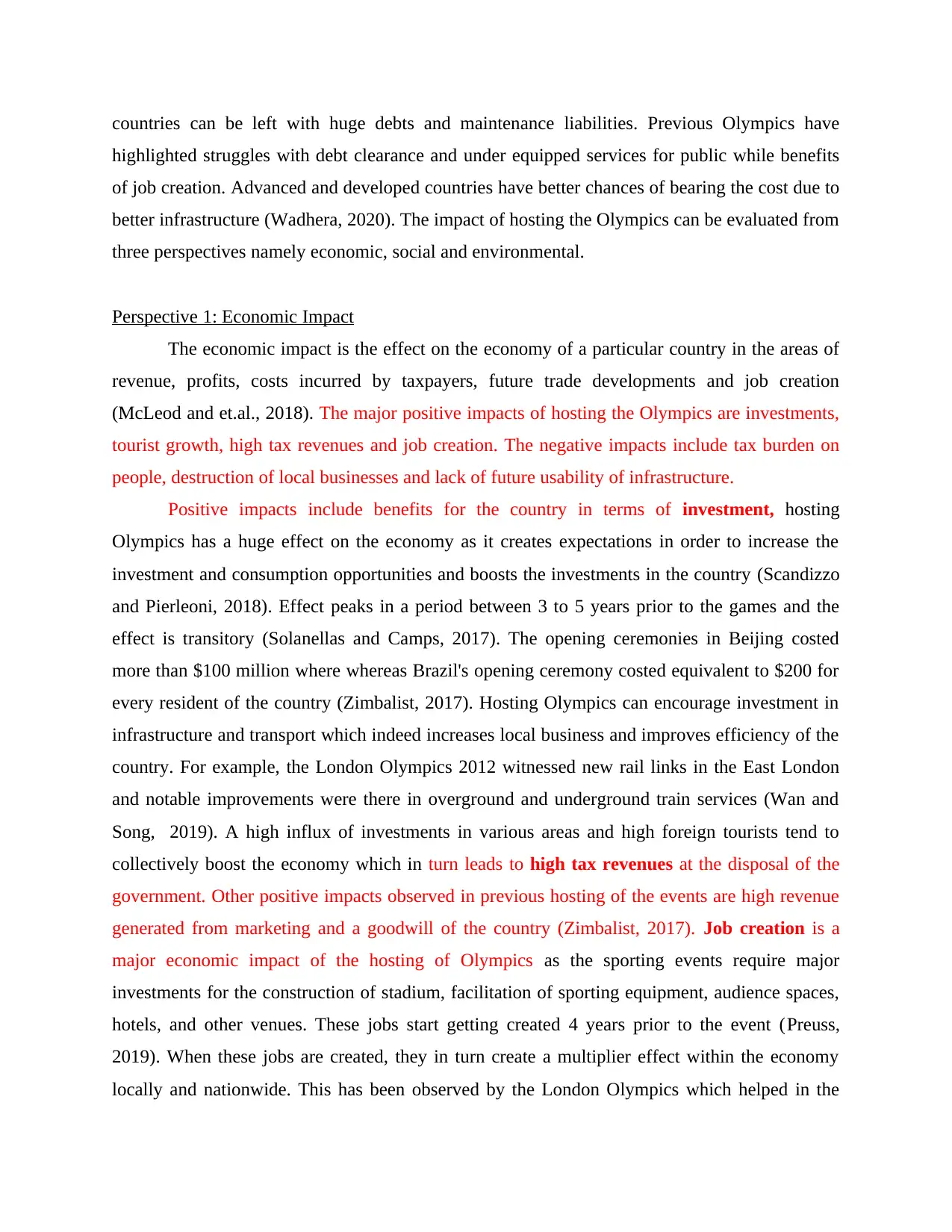
countries can be left with huge debts and maintenance liabilities. Previous Olympics have
highlighted struggles with debt clearance and under equipped services for public while benefits
of job creation. Advanced and developed countries have better chances of bearing the cost due to
better infrastructure (Wadhera, 2020). The impact of hosting the Olympics can be evaluated from
three perspectives namely economic, social and environmental.
Perspective 1: Economic Impact
The economic impact is the effect on the economy of a particular country in the areas of
revenue, profits, costs incurred by taxpayers, future trade developments and job creation
(McLeod and et.al., 2018). The major positive impacts of hosting the Olympics are investments,
tourist growth, high tax revenues and job creation. The negative impacts include tax burden on
people, destruction of local businesses and lack of future usability of infrastructure.
Positive impacts include benefits for the country in terms of investment, hosting
Olympics has a huge effect on the economy as it creates expectations in order to increase the
investment and consumption opportunities and boosts the investments in the country (Scandizzo
and Pierleoni, 2018). Effect peaks in a period between 3 to 5 years prior to the games and the
effect is transitory (Solanellas and Camps, 2017). The opening ceremonies in Beijing costed
more than $100 million where whereas Brazil's opening ceremony costed equivalent to $200 for
every resident of the country (Zimbalist, 2017). Hosting Olympics can encourage investment in
infrastructure and transport which indeed increases local business and improves efficiency of the
country. For example, the London Olympics 2012 witnessed new rail links in the East London
and notable improvements were there in overground and underground train services (Wan and
Song, 2019). A high influx of investments in various areas and high foreign tourists tend to
collectively boost the economy which in turn leads to high tax revenues at the disposal of the
government. Other positive impacts observed in previous hosting of the events are high revenue
generated from marketing and a goodwill of the country (Zimbalist, 2017). Job creation is a
major economic impact of the hosting of Olympics as the sporting events require major
investments for the construction of stadium, facilitation of sporting equipment, audience spaces,
hotels, and other venues. These jobs start getting created 4 years prior to the event (Preuss,
2019). When these jobs are created, they in turn create a multiplier effect within the economy
locally and nationwide. This has been observed by the London Olympics which helped in the
highlighted struggles with debt clearance and under equipped services for public while benefits
of job creation. Advanced and developed countries have better chances of bearing the cost due to
better infrastructure (Wadhera, 2020). The impact of hosting the Olympics can be evaluated from
three perspectives namely economic, social and environmental.
Perspective 1: Economic Impact
The economic impact is the effect on the economy of a particular country in the areas of
revenue, profits, costs incurred by taxpayers, future trade developments and job creation
(McLeod and et.al., 2018). The major positive impacts of hosting the Olympics are investments,
tourist growth, high tax revenues and job creation. The negative impacts include tax burden on
people, destruction of local businesses and lack of future usability of infrastructure.
Positive impacts include benefits for the country in terms of investment, hosting
Olympics has a huge effect on the economy as it creates expectations in order to increase the
investment and consumption opportunities and boosts the investments in the country (Scandizzo
and Pierleoni, 2018). Effect peaks in a period between 3 to 5 years prior to the games and the
effect is transitory (Solanellas and Camps, 2017). The opening ceremonies in Beijing costed
more than $100 million where whereas Brazil's opening ceremony costed equivalent to $200 for
every resident of the country (Zimbalist, 2017). Hosting Olympics can encourage investment in
infrastructure and transport which indeed increases local business and improves efficiency of the
country. For example, the London Olympics 2012 witnessed new rail links in the East London
and notable improvements were there in overground and underground train services (Wan and
Song, 2019). A high influx of investments in various areas and high foreign tourists tend to
collectively boost the economy which in turn leads to high tax revenues at the disposal of the
government. Other positive impacts observed in previous hosting of the events are high revenue
generated from marketing and a goodwill of the country (Zimbalist, 2017). Job creation is a
major economic impact of the hosting of Olympics as the sporting events require major
investments for the construction of stadium, facilitation of sporting equipment, audience spaces,
hotels, and other venues. These jobs start getting created 4 years prior to the event (Preuss,
2019). When these jobs are created, they in turn create a multiplier effect within the economy
locally and nationwide. This has been observed by the London Olympics which helped in the
⊘ This is a preview!⊘
Do you want full access?
Subscribe today to unlock all pages.

Trusted by 1+ million students worldwide
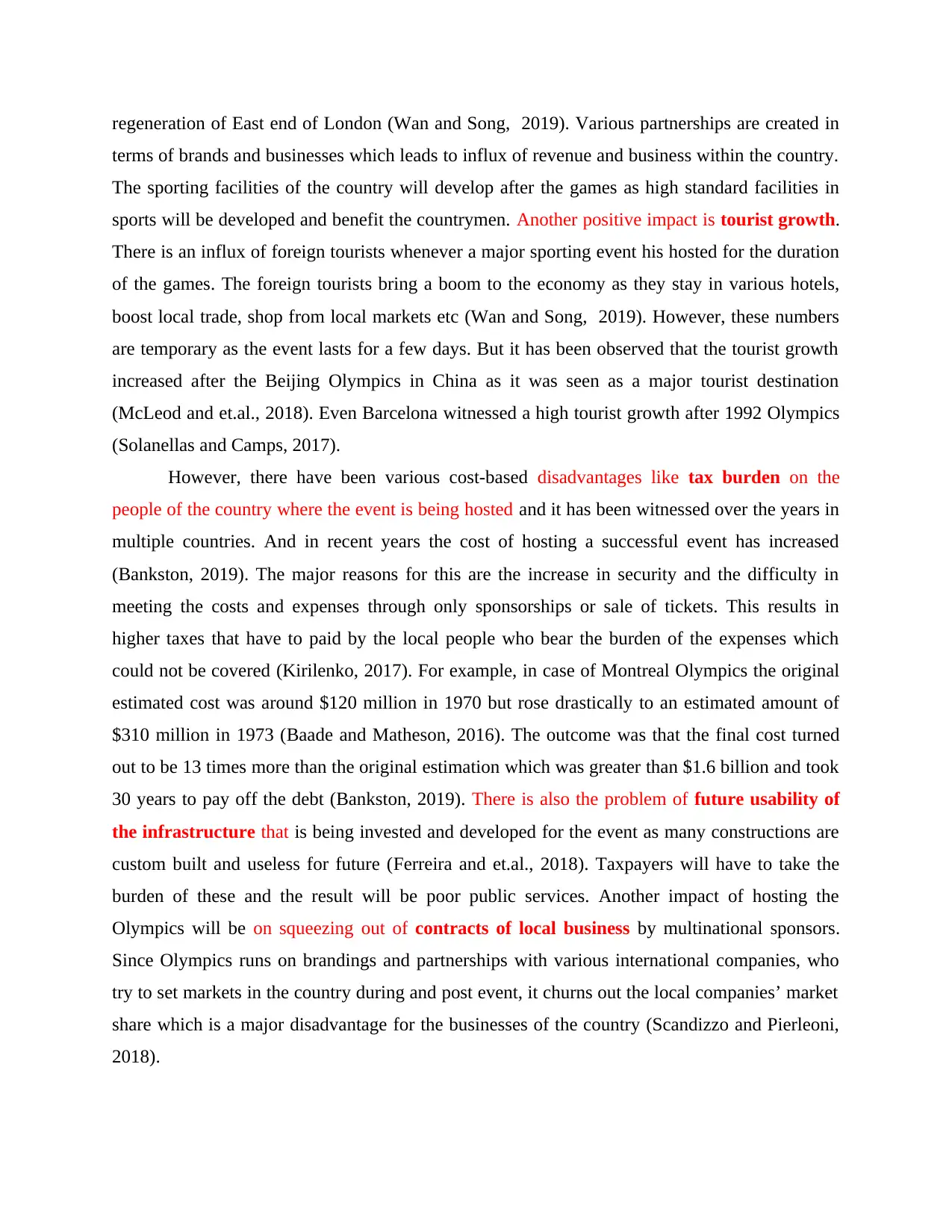
regeneration of East end of London (Wan and Song, 2019). Various partnerships are created in
terms of brands and businesses which leads to influx of revenue and business within the country.
The sporting facilities of the country will develop after the games as high standard facilities in
sports will be developed and benefit the countrymen. Another positive impact is tourist growth.
There is an influx of foreign tourists whenever a major sporting event his hosted for the duration
of the games. The foreign tourists bring a boom to the economy as they stay in various hotels,
boost local trade, shop from local markets etc (Wan and Song, 2019). However, these numbers
are temporary as the event lasts for a few days. But it has been observed that the tourist growth
increased after the Beijing Olympics in China as it was seen as a major tourist destination
(McLeod and et.al., 2018). Even Barcelona witnessed a high tourist growth after 1992 Olympics
(Solanellas and Camps, 2017).
However, there have been various cost-based disadvantages like tax burden on the
people of the country where the event is being hosted and it has been witnessed over the years in
multiple countries. And in recent years the cost of hosting a successful event has increased
(Bankston, 2019). The major reasons for this are the increase in security and the difficulty in
meeting the costs and expenses through only sponsorships or sale of tickets. This results in
higher taxes that have to paid by the local people who bear the burden of the expenses which
could not be covered (Kirilenko, 2017). For example, in case of Montreal Olympics the original
estimated cost was around $120 million in 1970 but rose drastically to an estimated amount of
$310 million in 1973 (Baade and Matheson, 2016). The outcome was that the final cost turned
out to be 13 times more than the original estimation which was greater than $1.6 billion and took
30 years to pay off the debt (Bankston, 2019). There is also the problem of future usability of
the infrastructure that is being invested and developed for the event as many constructions are
custom built and useless for future (Ferreira and et.al., 2018). Taxpayers will have to take the
burden of these and the result will be poor public services. Another impact of hosting the
Olympics will be on squeezing out of contracts of local business by multinational sponsors.
Since Olympics runs on brandings and partnerships with various international companies, who
try to set markets in the country during and post event, it churns out the local companies’ market
share which is a major disadvantage for the businesses of the country (Scandizzo and Pierleoni,
2018).
terms of brands and businesses which leads to influx of revenue and business within the country.
The sporting facilities of the country will develop after the games as high standard facilities in
sports will be developed and benefit the countrymen. Another positive impact is tourist growth.
There is an influx of foreign tourists whenever a major sporting event his hosted for the duration
of the games. The foreign tourists bring a boom to the economy as they stay in various hotels,
boost local trade, shop from local markets etc (Wan and Song, 2019). However, these numbers
are temporary as the event lasts for a few days. But it has been observed that the tourist growth
increased after the Beijing Olympics in China as it was seen as a major tourist destination
(McLeod and et.al., 2018). Even Barcelona witnessed a high tourist growth after 1992 Olympics
(Solanellas and Camps, 2017).
However, there have been various cost-based disadvantages like tax burden on the
people of the country where the event is being hosted and it has been witnessed over the years in
multiple countries. And in recent years the cost of hosting a successful event has increased
(Bankston, 2019). The major reasons for this are the increase in security and the difficulty in
meeting the costs and expenses through only sponsorships or sale of tickets. This results in
higher taxes that have to paid by the local people who bear the burden of the expenses which
could not be covered (Kirilenko, 2017). For example, in case of Montreal Olympics the original
estimated cost was around $120 million in 1970 but rose drastically to an estimated amount of
$310 million in 1973 (Baade and Matheson, 2016). The outcome was that the final cost turned
out to be 13 times more than the original estimation which was greater than $1.6 billion and took
30 years to pay off the debt (Bankston, 2019). There is also the problem of future usability of
the infrastructure that is being invested and developed for the event as many constructions are
custom built and useless for future (Ferreira and et.al., 2018). Taxpayers will have to take the
burden of these and the result will be poor public services. Another impact of hosting the
Olympics will be on squeezing out of contracts of local business by multinational sponsors.
Since Olympics runs on brandings and partnerships with various international companies, who
try to set markets in the country during and post event, it churns out the local companies’ market
share which is a major disadvantage for the businesses of the country (Scandizzo and Pierleoni,
2018).
Paraphrase This Document
Need a fresh take? Get an instant paraphrase of this document with our AI Paraphraser
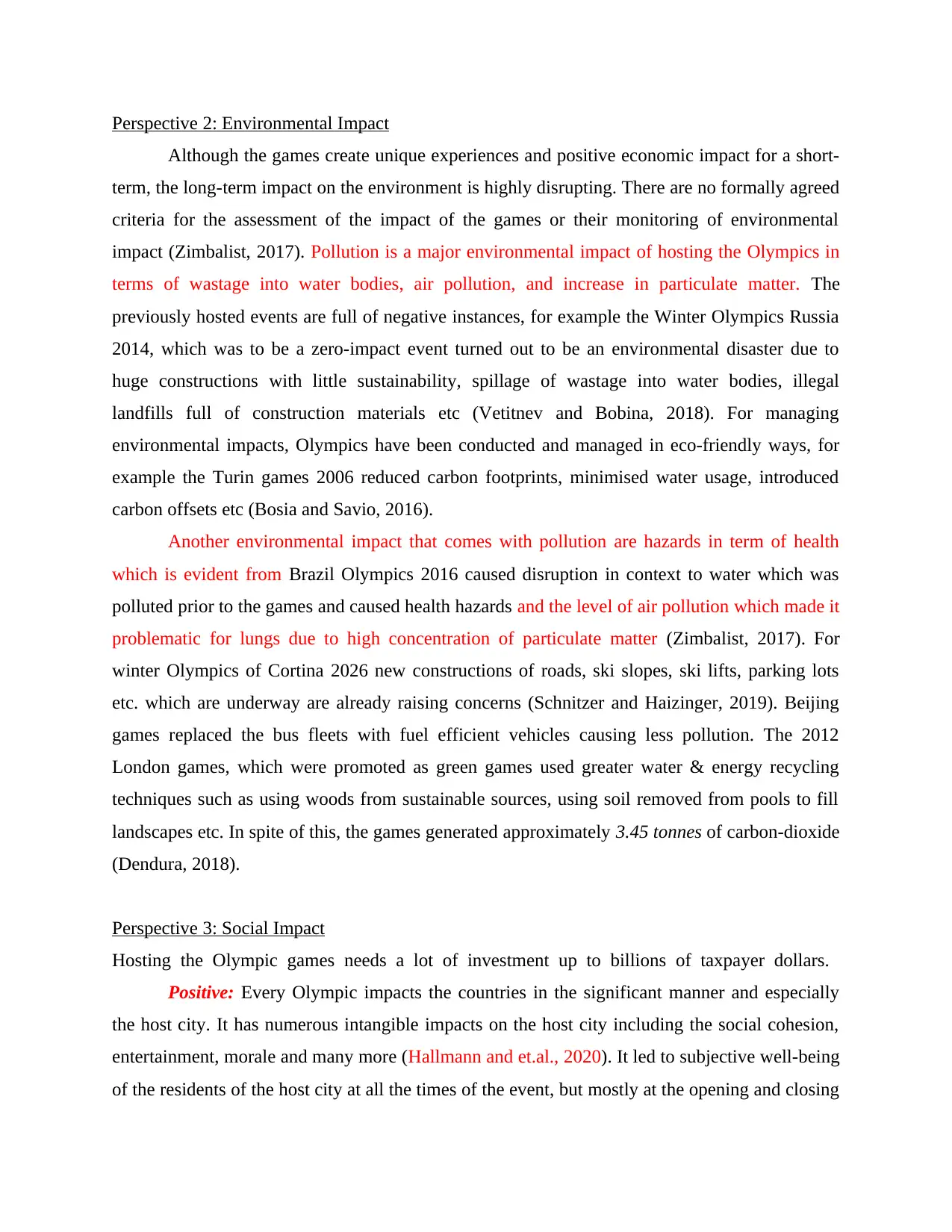
Perspective 2: Environmental Impact
Although the games create unique experiences and positive economic impact for a short-
term, the long-term impact on the environment is highly disrupting. There are no formally agreed
criteria for the assessment of the impact of the games or their monitoring of environmental
impact (Zimbalist, 2017). Pollution is a major environmental impact of hosting the Olympics in
terms of wastage into water bodies, air pollution, and increase in particulate matter. The
previously hosted events are full of negative instances, for example the Winter Olympics Russia
2014, which was to be a zero-impact event turned out to be an environmental disaster due to
huge constructions with little sustainability, spillage of wastage into water bodies, illegal
landfills full of construction materials etc (Vetitnev and Bobina, 2018). For managing
environmental impacts, Olympics have been conducted and managed in eco-friendly ways, for
example the Turin games 2006 reduced carbon footprints, minimised water usage, introduced
carbon offsets etc (Bosia and Savio, 2016).
Another environmental impact that comes with pollution are hazards in term of health
which is evident from Brazil Olympics 2016 caused disruption in context to water which was
polluted prior to the games and caused health hazards and the level of air pollution which made it
problematic for lungs due to high concentration of particulate matter (Zimbalist, 2017). For
winter Olympics of Cortina 2026 new constructions of roads, ski slopes, ski lifts, parking lots
etc. which are underway are already raising concerns (Schnitzer and Haizinger, 2019). Beijing
games replaced the bus fleets with fuel efficient vehicles causing less pollution. The 2012
London games, which were promoted as green games used greater water & energy recycling
techniques such as using woods from sustainable sources, using soil removed from pools to fill
landscapes etc. In spite of this, the games generated approximately 3.45 tonnes of carbon-dioxide
(Dendura, 2018).
Perspective 3: Social Impact
Hosting the Olympic games needs a lot of investment up to billions of taxpayer dollars.
Positive: Every Olympic impacts the countries in the significant manner and especially
the host city. It has numerous intangible impacts on the host city including the social cohesion,
entertainment, morale and many more (Hallmann and et.al., 2020). It led to subjective well-being
of the residents of the host city at all the times of the event, but mostly at the opening and closing
Although the games create unique experiences and positive economic impact for a short-
term, the long-term impact on the environment is highly disrupting. There are no formally agreed
criteria for the assessment of the impact of the games or their monitoring of environmental
impact (Zimbalist, 2017). Pollution is a major environmental impact of hosting the Olympics in
terms of wastage into water bodies, air pollution, and increase in particulate matter. The
previously hosted events are full of negative instances, for example the Winter Olympics Russia
2014, which was to be a zero-impact event turned out to be an environmental disaster due to
huge constructions with little sustainability, spillage of wastage into water bodies, illegal
landfills full of construction materials etc (Vetitnev and Bobina, 2018). For managing
environmental impacts, Olympics have been conducted and managed in eco-friendly ways, for
example the Turin games 2006 reduced carbon footprints, minimised water usage, introduced
carbon offsets etc (Bosia and Savio, 2016).
Another environmental impact that comes with pollution are hazards in term of health
which is evident from Brazil Olympics 2016 caused disruption in context to water which was
polluted prior to the games and caused health hazards and the level of air pollution which made it
problematic for lungs due to high concentration of particulate matter (Zimbalist, 2017). For
winter Olympics of Cortina 2026 new constructions of roads, ski slopes, ski lifts, parking lots
etc. which are underway are already raising concerns (Schnitzer and Haizinger, 2019). Beijing
games replaced the bus fleets with fuel efficient vehicles causing less pollution. The 2012
London games, which were promoted as green games used greater water & energy recycling
techniques such as using woods from sustainable sources, using soil removed from pools to fill
landscapes etc. In spite of this, the games generated approximately 3.45 tonnes of carbon-dioxide
(Dendura, 2018).
Perspective 3: Social Impact
Hosting the Olympic games needs a lot of investment up to billions of taxpayer dollars.
Positive: Every Olympic impacts the countries in the significant manner and especially
the host city. It has numerous intangible impacts on the host city including the social cohesion,
entertainment, morale and many more (Hallmann and et.al., 2020). It led to subjective well-being
of the residents of the host city at all the times of the event, but mostly at the opening and closing
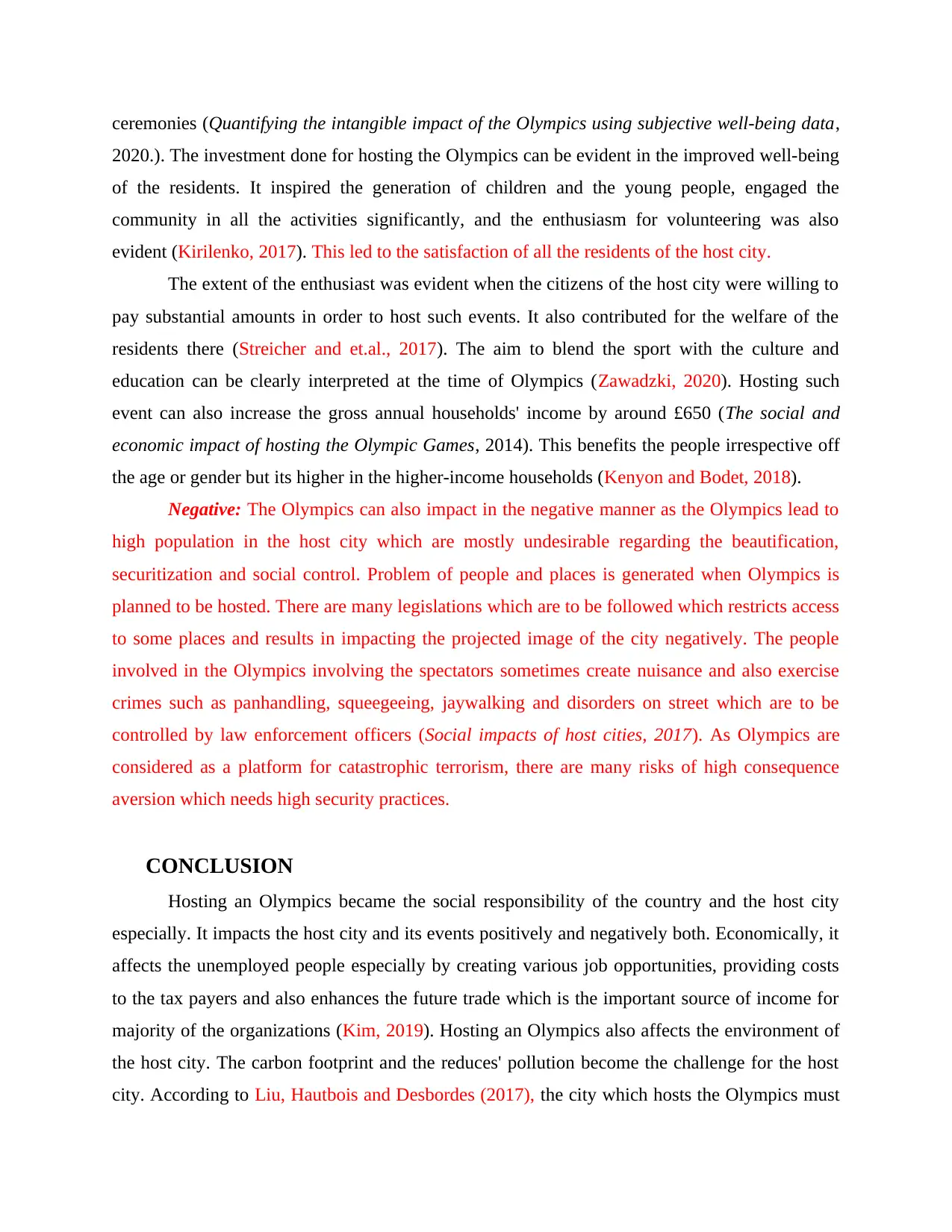
ceremonies (Quantifying the intangible impact of the Olympics using subjective well-being data,
2020.). The investment done for hosting the Olympics can be evident in the improved well-being
of the residents. It inspired the generation of children and the young people, engaged the
community in all the activities significantly, and the enthusiasm for volunteering was also
evident (Kirilenko, 2017). This led to the satisfaction of all the residents of the host city.
The extent of the enthusiast was evident when the citizens of the host city were willing to
pay substantial amounts in order to host such events. It also contributed for the welfare of the
residents there (Streicher and et.al., 2017). The aim to blend the sport with the culture and
education can be clearly interpreted at the time of Olympics (Zawadzki, 2020). Hosting such
event can also increase the gross annual households' income by around £650 (The social and
economic impact of hosting the Olympic Games, 2014). This benefits the people irrespective off
the age or gender but its higher in the higher-income households (Kenyon and Bodet, 2018).
Negative: The Olympics can also impact in the negative manner as the Olympics lead to
high population in the host city which are mostly undesirable regarding the beautification,
securitization and social control. Problem of people and places is generated when Olympics is
planned to be hosted. There are many legislations which are to be followed which restricts access
to some places and results in impacting the projected image of the city negatively. The people
involved in the Olympics involving the spectators sometimes create nuisance and also exercise
crimes such as panhandling, squeegeeing, jaywalking and disorders on street which are to be
controlled by law enforcement officers (Social impacts of host cities, 2017). As Olympics are
considered as a platform for catastrophic terrorism, there are many risks of high consequence
aversion which needs high security practices.
CONCLUSION
Hosting an Olympics became the social responsibility of the country and the host city
especially. It impacts the host city and its events positively and negatively both. Economically, it
affects the unemployed people especially by creating various job opportunities, providing costs
to the tax payers and also enhances the future trade which is the important source of income for
majority of the organizations (Kim, 2019). Hosting an Olympics also affects the environment of
the host city. The carbon footprint and the reduces' pollution become the challenge for the host
city. According to Liu, Hautbois and Desbordes (2017), the city which hosts the Olympics must
2020.). The investment done for hosting the Olympics can be evident in the improved well-being
of the residents. It inspired the generation of children and the young people, engaged the
community in all the activities significantly, and the enthusiasm for volunteering was also
evident (Kirilenko, 2017). This led to the satisfaction of all the residents of the host city.
The extent of the enthusiast was evident when the citizens of the host city were willing to
pay substantial amounts in order to host such events. It also contributed for the welfare of the
residents there (Streicher and et.al., 2017). The aim to blend the sport with the culture and
education can be clearly interpreted at the time of Olympics (Zawadzki, 2020). Hosting such
event can also increase the gross annual households' income by around £650 (The social and
economic impact of hosting the Olympic Games, 2014). This benefits the people irrespective off
the age or gender but its higher in the higher-income households (Kenyon and Bodet, 2018).
Negative: The Olympics can also impact in the negative manner as the Olympics lead to
high population in the host city which are mostly undesirable regarding the beautification,
securitization and social control. Problem of people and places is generated when Olympics is
planned to be hosted. There are many legislations which are to be followed which restricts access
to some places and results in impacting the projected image of the city negatively. The people
involved in the Olympics involving the spectators sometimes create nuisance and also exercise
crimes such as panhandling, squeegeeing, jaywalking and disorders on street which are to be
controlled by law enforcement officers (Social impacts of host cities, 2017). As Olympics are
considered as a platform for catastrophic terrorism, there are many risks of high consequence
aversion which needs high security practices.
CONCLUSION
Hosting an Olympics became the social responsibility of the country and the host city
especially. It impacts the host city and its events positively and negatively both. Economically, it
affects the unemployed people especially by creating various job opportunities, providing costs
to the tax payers and also enhances the future trade which is the important source of income for
majority of the organizations (Kim, 2019). Hosting an Olympics also affects the environment of
the host city. The carbon footprint and the reduces' pollution become the challenge for the host
city. According to Liu, Hautbois and Desbordes (2017), the city which hosts the Olympics must
⊘ This is a preview!⊘
Do you want full access?
Subscribe today to unlock all pages.

Trusted by 1+ million students worldwide
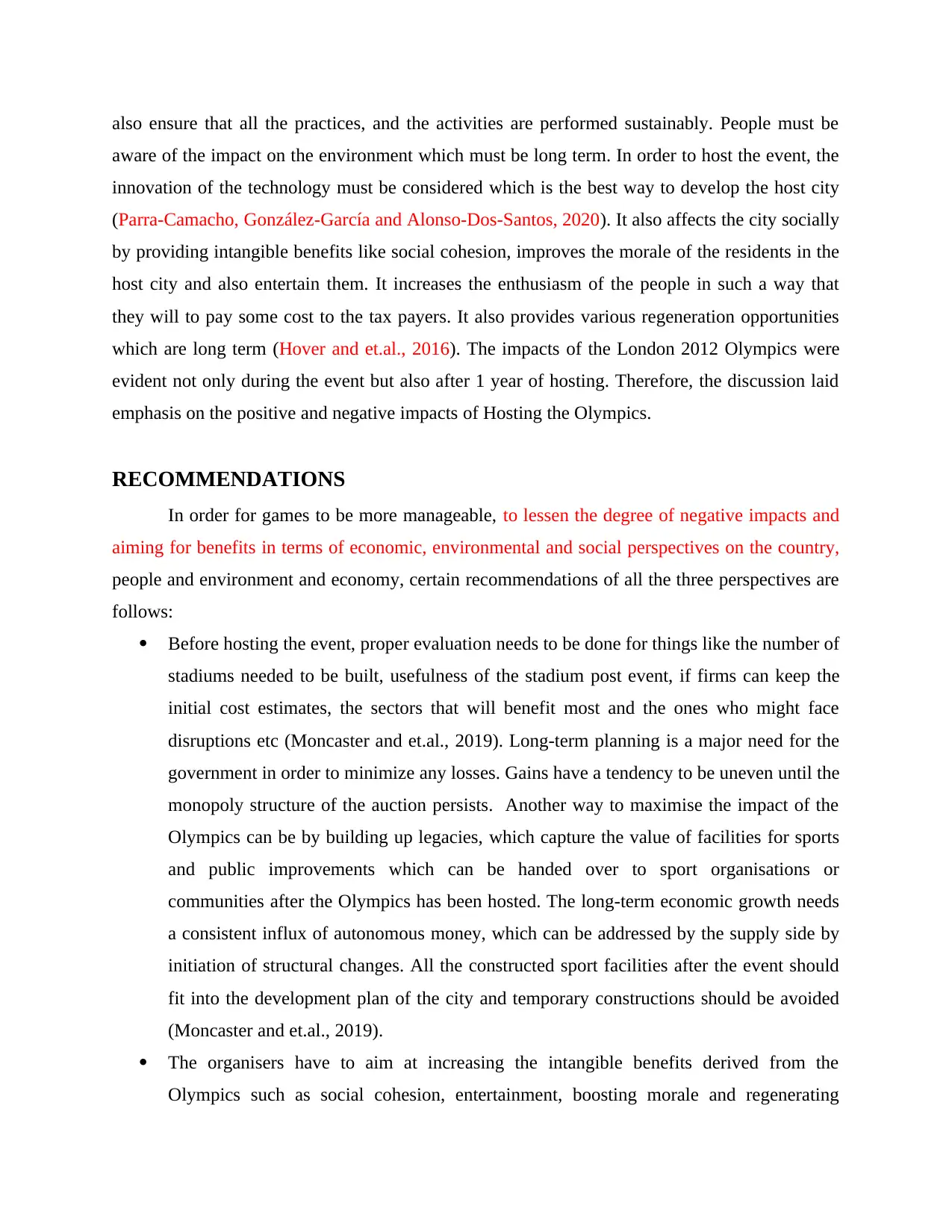
also ensure that all the practices, and the activities are performed sustainably. People must be
aware of the impact on the environment which must be long term. In order to host the event, the
innovation of the technology must be considered which is the best way to develop the host city
(Parra-Camacho, González-García and Alonso-Dos-Santos, 2020). It also affects the city socially
by providing intangible benefits like social cohesion, improves the morale of the residents in the
host city and also entertain them. It increases the enthusiasm of the people in such a way that
they will to pay some cost to the tax payers. It also provides various regeneration opportunities
which are long term (Hover and et.al., 2016). The impacts of the London 2012 Olympics were
evident not only during the event but also after 1 year of hosting. Therefore, the discussion laid
emphasis on the positive and negative impacts of Hosting the Olympics.
RECOMMENDATIONS
In order for games to be more manageable, to lessen the degree of negative impacts and
aiming for benefits in terms of economic, environmental and social perspectives on the country,
people and environment and economy, certain recommendations of all the three perspectives are
follows:
Before hosting the event, proper evaluation needs to be done for things like the number of
stadiums needed to be built, usefulness of the stadium post event, if firms can keep the
initial cost estimates, the sectors that will benefit most and the ones who might face
disruptions etc (Moncaster and et.al., 2019). Long-term planning is a major need for the
government in order to minimize any losses. Gains have a tendency to be uneven until the
monopoly structure of the auction persists. Another way to maximise the impact of the
Olympics can be by building up legacies, which capture the value of facilities for sports
and public improvements which can be handed over to sport organisations or
communities after the Olympics has been hosted. The long-term economic growth needs
a consistent influx of autonomous money, which can be addressed by the supply side by
initiation of structural changes. All the constructed sport facilities after the event should
fit into the development plan of the city and temporary constructions should be avoided
(Moncaster and et.al., 2019).
The organisers have to aim at increasing the intangible benefits derived from the
Olympics such as social cohesion, entertainment, boosting morale and regenerating
aware of the impact on the environment which must be long term. In order to host the event, the
innovation of the technology must be considered which is the best way to develop the host city
(Parra-Camacho, González-García and Alonso-Dos-Santos, 2020). It also affects the city socially
by providing intangible benefits like social cohesion, improves the morale of the residents in the
host city and also entertain them. It increases the enthusiasm of the people in such a way that
they will to pay some cost to the tax payers. It also provides various regeneration opportunities
which are long term (Hover and et.al., 2016). The impacts of the London 2012 Olympics were
evident not only during the event but also after 1 year of hosting. Therefore, the discussion laid
emphasis on the positive and negative impacts of Hosting the Olympics.
RECOMMENDATIONS
In order for games to be more manageable, to lessen the degree of negative impacts and
aiming for benefits in terms of economic, environmental and social perspectives on the country,
people and environment and economy, certain recommendations of all the three perspectives are
follows:
Before hosting the event, proper evaluation needs to be done for things like the number of
stadiums needed to be built, usefulness of the stadium post event, if firms can keep the
initial cost estimates, the sectors that will benefit most and the ones who might face
disruptions etc (Moncaster and et.al., 2019). Long-term planning is a major need for the
government in order to minimize any losses. Gains have a tendency to be uneven until the
monopoly structure of the auction persists. Another way to maximise the impact of the
Olympics can be by building up legacies, which capture the value of facilities for sports
and public improvements which can be handed over to sport organisations or
communities after the Olympics has been hosted. The long-term economic growth needs
a consistent influx of autonomous money, which can be addressed by the supply side by
initiation of structural changes. All the constructed sport facilities after the event should
fit into the development plan of the city and temporary constructions should be avoided
(Moncaster and et.al., 2019).
The organisers have to aim at increasing the intangible benefits derived from the
Olympics such as social cohesion, entertainment, boosting morale and regenerating
Paraphrase This Document
Need a fresh take? Get an instant paraphrase of this document with our AI Paraphraser
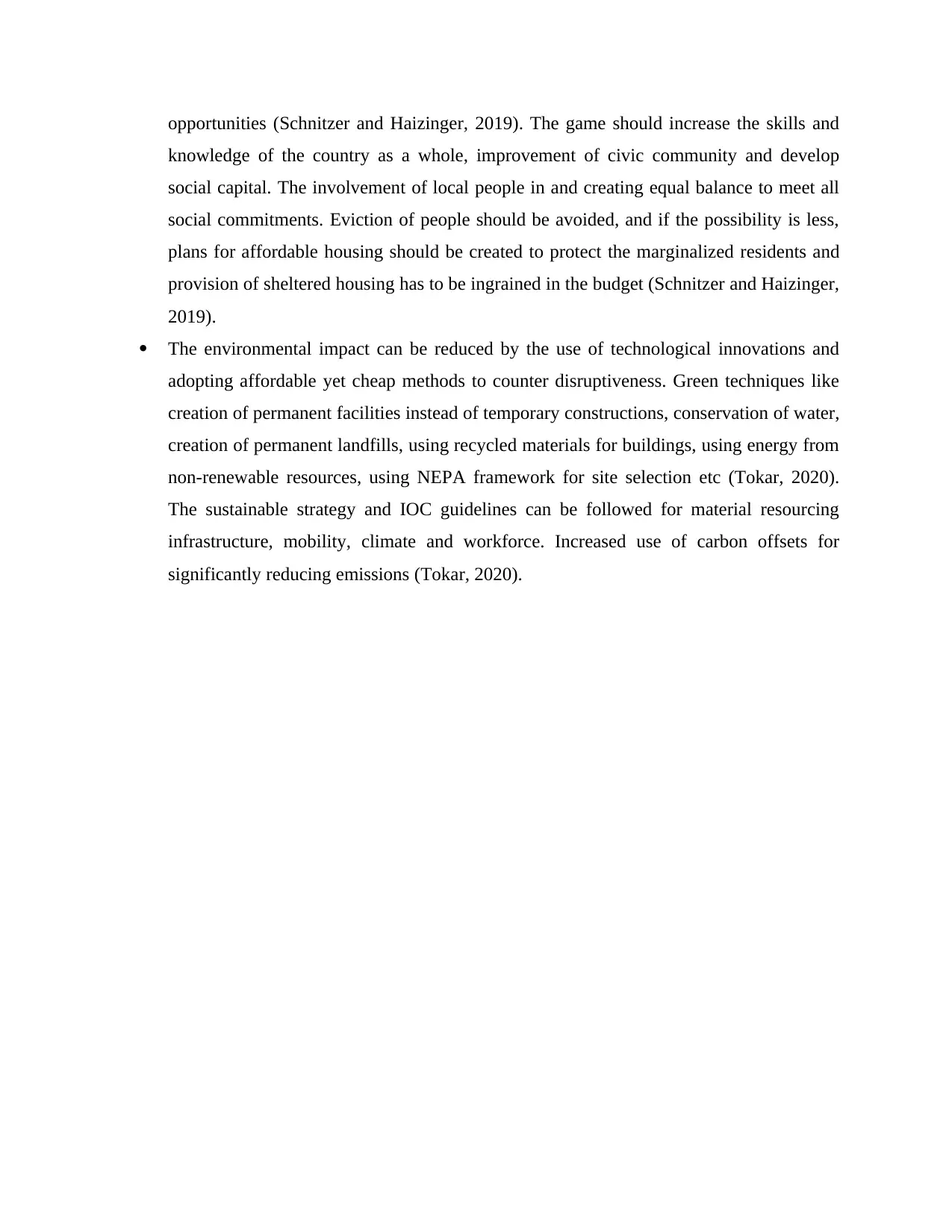
opportunities (Schnitzer and Haizinger, 2019). The game should increase the skills and
knowledge of the country as a whole, improvement of civic community and develop
social capital. The involvement of local people in and creating equal balance to meet all
social commitments. Eviction of people should be avoided, and if the possibility is less,
plans for affordable housing should be created to protect the marginalized residents and
provision of sheltered housing has to be ingrained in the budget (Schnitzer and Haizinger,
2019).
The environmental impact can be reduced by the use of technological innovations and
adopting affordable yet cheap methods to counter disruptiveness. Green techniques like
creation of permanent facilities instead of temporary constructions, conservation of water,
creation of permanent landfills, using recycled materials for buildings, using energy from
non-renewable resources, using NEPA framework for site selection etc (Tokar, 2020).
The sustainable strategy and IOC guidelines can be followed for material resourcing
infrastructure, mobility, climate and workforce. Increased use of carbon offsets for
significantly reducing emissions (Tokar, 2020).
knowledge of the country as a whole, improvement of civic community and develop
social capital. The involvement of local people in and creating equal balance to meet all
social commitments. Eviction of people should be avoided, and if the possibility is less,
plans for affordable housing should be created to protect the marginalized residents and
provision of sheltered housing has to be ingrained in the budget (Schnitzer and Haizinger,
2019).
The environmental impact can be reduced by the use of technological innovations and
adopting affordable yet cheap methods to counter disruptiveness. Green techniques like
creation of permanent facilities instead of temporary constructions, conservation of water,
creation of permanent landfills, using recycled materials for buildings, using energy from
non-renewable resources, using NEPA framework for site selection etc (Tokar, 2020).
The sustainable strategy and IOC guidelines can be followed for material resourcing
infrastructure, mobility, climate and workforce. Increased use of carbon offsets for
significantly reducing emissions (Tokar, 2020).
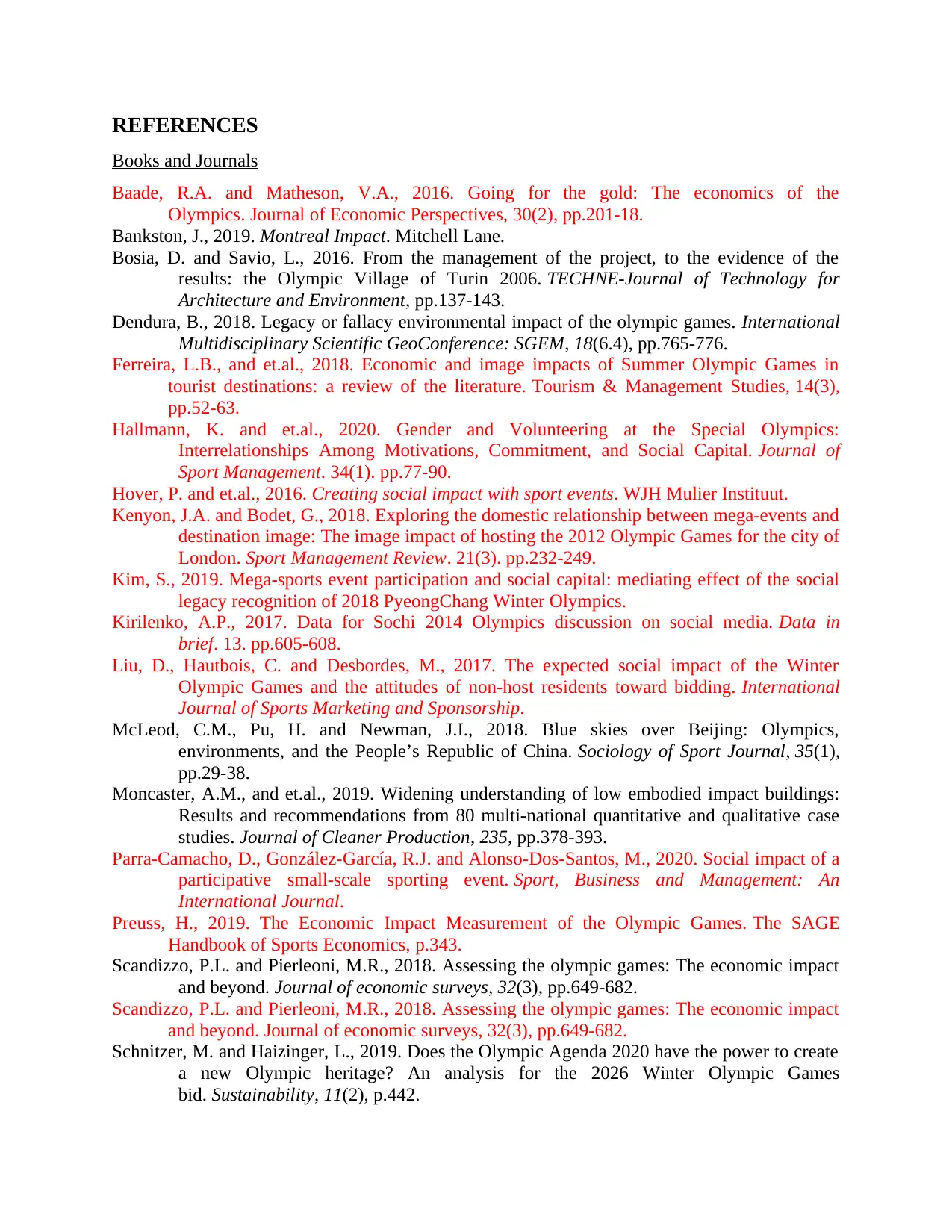
REFERENCES
Books and Journals
Baade, R.A. and Matheson, V.A., 2016. Going for the gold: The economics of the
Olympics. Journal of Economic Perspectives, 30(2), pp.201-18.
Bankston, J., 2019. Montreal Impact. Mitchell Lane.
Bosia, D. and Savio, L., 2016. From the management of the project, to the evidence of the
results: the Olympic Village of Turin 2006. TECHNE-Journal of Technology for
Architecture and Environment, pp.137-143.
Dendura, B., 2018. Legacy or fallacy environmental impact of the olympic games. International
Multidisciplinary Scientific GeoConference: SGEM, 18(6.4), pp.765-776.
Ferreira, L.B., and et.al., 2018. Economic and image impacts of Summer Olympic Games in
tourist destinations: a review of the literature. Tourism & Management Studies, 14(3),
pp.52-63.
Hallmann, K. and et.al., 2020. Gender and Volunteering at the Special Olympics:
Interrelationships Among Motivations, Commitment, and Social Capital. Journal of
Sport Management. 34(1). pp.77-90.
Hover, P. and et.al., 2016. Creating social impact with sport events. WJH Mulier Instituut.
Kenyon, J.A. and Bodet, G., 2018. Exploring the domestic relationship between mega-events and
destination image: The image impact of hosting the 2012 Olympic Games for the city of
London. Sport Management Review. 21(3). pp.232-249.
Kim, S., 2019. Mega-sports event participation and social capital: mediating effect of the social
legacy recognition of 2018 PyeongChang Winter Olympics.
Kirilenko, A.P., 2017. Data for Sochi 2014 Olympics discussion on social media. Data in
brief. 13. pp.605-608.
Liu, D., Hautbois, C. and Desbordes, M., 2017. The expected social impact of the Winter
Olympic Games and the attitudes of non-host residents toward bidding. International
Journal of Sports Marketing and Sponsorship.
McLeod, C.M., Pu, H. and Newman, J.I., 2018. Blue skies over Beijing: Olympics,
environments, and the People’s Republic of China. Sociology of Sport Journal, 35(1),
pp.29-38.
Moncaster, A.M., and et.al., 2019. Widening understanding of low embodied impact buildings:
Results and recommendations from 80 multi-national quantitative and qualitative case
studies. Journal of Cleaner Production, 235, pp.378-393.
Parra-Camacho, D., González-García, R.J. and Alonso-Dos-Santos, M., 2020. Social impact of a
participative small-scale sporting event. Sport, Business and Management: An
International Journal.
Preuss, H., 2019. The Economic Impact Measurement of the Olympic Games. The SAGE
Handbook of Sports Economics, p.343.
Scandizzo, P.L. and Pierleoni, M.R., 2018. Assessing the olympic games: The economic impact
and beyond. Journal of economic surveys, 32(3), pp.649-682.
Scandizzo, P.L. and Pierleoni, M.R., 2018. Assessing the olympic games: The economic impact
and beyond. Journal of economic surveys, 32(3), pp.649-682.
Schnitzer, M. and Haizinger, L., 2019. Does the Olympic Agenda 2020 have the power to create
a new Olympic heritage? An analysis for the 2026 Winter Olympic Games
bid. Sustainability, 11(2), p.442.
Books and Journals
Baade, R.A. and Matheson, V.A., 2016. Going for the gold: The economics of the
Olympics. Journal of Economic Perspectives, 30(2), pp.201-18.
Bankston, J., 2019. Montreal Impact. Mitchell Lane.
Bosia, D. and Savio, L., 2016. From the management of the project, to the evidence of the
results: the Olympic Village of Turin 2006. TECHNE-Journal of Technology for
Architecture and Environment, pp.137-143.
Dendura, B., 2018. Legacy or fallacy environmental impact of the olympic games. International
Multidisciplinary Scientific GeoConference: SGEM, 18(6.4), pp.765-776.
Ferreira, L.B., and et.al., 2018. Economic and image impacts of Summer Olympic Games in
tourist destinations: a review of the literature. Tourism & Management Studies, 14(3),
pp.52-63.
Hallmann, K. and et.al., 2020. Gender and Volunteering at the Special Olympics:
Interrelationships Among Motivations, Commitment, and Social Capital. Journal of
Sport Management. 34(1). pp.77-90.
Hover, P. and et.al., 2016. Creating social impact with sport events. WJH Mulier Instituut.
Kenyon, J.A. and Bodet, G., 2018. Exploring the domestic relationship between mega-events and
destination image: The image impact of hosting the 2012 Olympic Games for the city of
London. Sport Management Review. 21(3). pp.232-249.
Kim, S., 2019. Mega-sports event participation and social capital: mediating effect of the social
legacy recognition of 2018 PyeongChang Winter Olympics.
Kirilenko, A.P., 2017. Data for Sochi 2014 Olympics discussion on social media. Data in
brief. 13. pp.605-608.
Liu, D., Hautbois, C. and Desbordes, M., 2017. The expected social impact of the Winter
Olympic Games and the attitudes of non-host residents toward bidding. International
Journal of Sports Marketing and Sponsorship.
McLeod, C.M., Pu, H. and Newman, J.I., 2018. Blue skies over Beijing: Olympics,
environments, and the People’s Republic of China. Sociology of Sport Journal, 35(1),
pp.29-38.
Moncaster, A.M., and et.al., 2019. Widening understanding of low embodied impact buildings:
Results and recommendations from 80 multi-national quantitative and qualitative case
studies. Journal of Cleaner Production, 235, pp.378-393.
Parra-Camacho, D., González-García, R.J. and Alonso-Dos-Santos, M., 2020. Social impact of a
participative small-scale sporting event. Sport, Business and Management: An
International Journal.
Preuss, H., 2019. The Economic Impact Measurement of the Olympic Games. The SAGE
Handbook of Sports Economics, p.343.
Scandizzo, P.L. and Pierleoni, M.R., 2018. Assessing the olympic games: The economic impact
and beyond. Journal of economic surveys, 32(3), pp.649-682.
Scandizzo, P.L. and Pierleoni, M.R., 2018. Assessing the olympic games: The economic impact
and beyond. Journal of economic surveys, 32(3), pp.649-682.
Schnitzer, M. and Haizinger, L., 2019. Does the Olympic Agenda 2020 have the power to create
a new Olympic heritage? An analysis for the 2026 Winter Olympic Games
bid. Sustainability, 11(2), p.442.
⊘ This is a preview!⊘
Do you want full access?
Subscribe today to unlock all pages.

Trusted by 1+ million students worldwide
1 out of 13
Related Documents
Your All-in-One AI-Powered Toolkit for Academic Success.
+13062052269
info@desklib.com
Available 24*7 on WhatsApp / Email
![[object Object]](/_next/static/media/star-bottom.7253800d.svg)
Unlock your academic potential
Copyright © 2020–2026 A2Z Services. All Rights Reserved. Developed and managed by ZUCOL.





